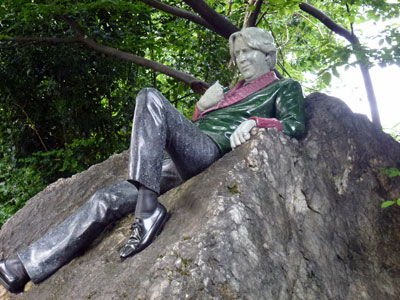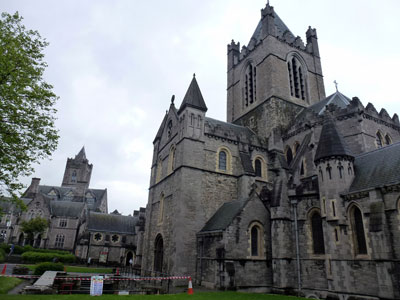A look at literary Dublin
This item appears on page 15 of the August 2014 issue.
Dublin is a city with a fascinating history dating back to the Vikings, yet modern Dublin is a city of culture and literary greats.
George Bernard Shaw was born in its Portobello neighborhood. Oscar Wilde lived there and loved it. William Butler Yeats was born there and is still celebrated, and James Joyce followed his most famous character, Leopold Bloom, through a day in Dublin.
My husband and I decided that in May 2014, after touring Ireland for two weeks with Grand Circle Travel (Boston, MA; 800/221-2610), we would spend several days exploring the city on our own.
We had already seen the better-known tourist sights, watched how Guinness is made, admired the lovely new exhibit of The Book of Kells at Trinity College and learned the history of St. Patrick’s Cathedral. We had also spent a day in the lovely fishing village of Howth. We were ready to go off on a cultural adventure.
We visited Christ Church Cathedral (Christchurch Place, Dublin 8, Ireland; phone 00 353 1 677 8099), where Handel’s “Messiah” was first performed in 1742. Admission cost €6 (near $8) for seniors. There was also an excavated chapel built by the Norse king Sitric, dating back to 1028, with a fascinating medieval crypt.
We discovered that there was a reading of James Joyce most days in Sweny’s Pharmacy (1 Lincoln Place, Dublin 2, Co. Dublin City, Ireland; phone +353 86 050 7995), which is immortalized in “Ulysses,” so we went there to meet some very interesting people and to participate in reading Joyce.
The owner of the shop, P.J. Murphy, was a cousin of Samuel Beckett. He distributed copies of a chosen book to people sitting in chairs placed along the walls of the small shop, who each took turns reading a page, discussing whatever came to mind.
The National Library of Ireland (2/3 Kildare St., Dublin 2, Ireland; phone +353 1 603 02 00) has a wonderful, free William Butler Yeats exhibit containing original manuscripts and letters written to his loves. Yeats had several unrequited loves before he married. Maud Gonne, the first of his loves, was his muse.
There is a multimedia exhibit in which Yeats’ poems are read by various people as the words and evocative pictures are projected onto a screen. The poignant poems are about Ireland and love.
We visited The Little Museum of Dublin (15 St. Stephen’s Green, Dublin 2, Ireland; phone +353 1 661 1000), located in a 3-story townhouse. The entrance fee was waived if you had a 3-day hop-on, hop-off bus pass.
The museum’s second floor has a permanent exhibit dedicated to memorabilia of the band U2 and singer Bono. I was happy to learn that Bono was awarded, among other things, a Nobel Man of Peace Prize in 2008 for his humanitarian efforts.
Also on the second floor was a touching photo exhibit by Brendan Walsh showing Dublin in the ’70s, when carriage by container was changing the shipping industry and many people lost their jobs.
The first floor was dedicated to an extremely clever history of Brian Boru in the form of cartoons by Fergal McCarthy. (Boru was an Irish king who defeated the Vikings and freed Ireland from foreign domination at the Battle of Clontarf in 1014.) Children were encouraged to make their own cartoons, which were then posted on the walls.
Oscar Wilde lived across the street from Merrion Square. There is a delightful statue of him in a rakish pose facing his home. The statue is flanked by two nudes, one a female and the other a male torso, which are mounted on columns inscribed with many of his best quotes.
We learned that Wilde was upset because the park was locked and available only to rich locals with keys, so he wrote a lovely little children’s story, “The Selfish Giant,” about a mean giant who wouldn’t allow people into his garden. Everything stopped growing there until he learned to share. The park is now open to all. A new playground was being built while we were there.
We completed our literary experience of Ireland with an outstanding performance of Wilde’s “An Ideal Husband” at the Gate Theatre (Cavendish Row, Dublin 1, Ireland; phone +353 1 874 4045). Tickets cost €32 ($44). The acting, set and costumes made a perfect dessert to our cultural meal.
IRMA GURMAN
Smithtown, NY


